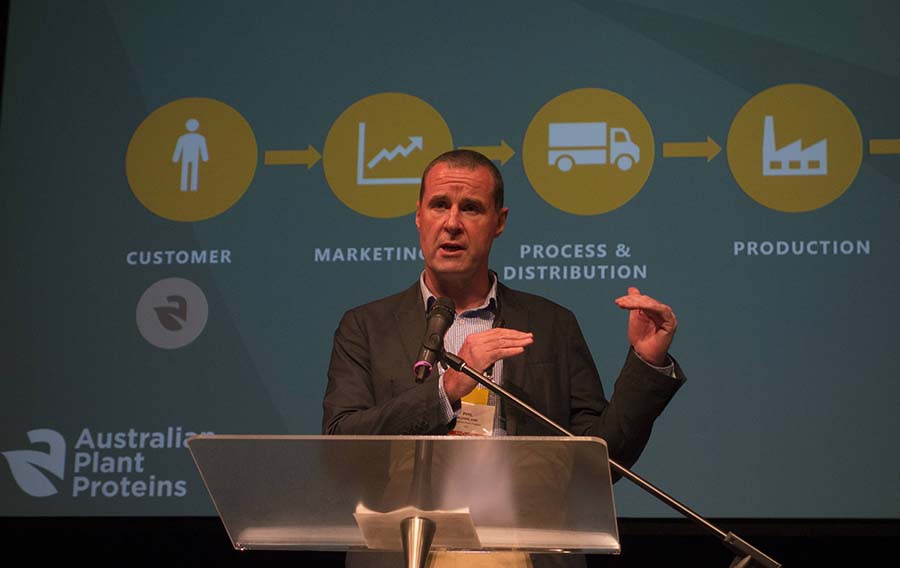A novel Australian business venture is expected to provide a new market option for pulse growers, delegates heard at the 2019 Australian Pulse Conference in Horsham, Victoria.
The source of this alternative market option is a start-up, established in an industrial pocket of Horsham, just a few blocks from the conference venue, near the Wimmera River.
There, two large, industrial sheds contain Australia's first commercial plant-based protein manufacturing facility developed by Australian Plant Proteins (APP).
In a keynote presentation, APP principal Phil McFarlane said the business concept has its origins in Wimmera Development Association research six years ago.
The research identified protein extraction from second-grade faba beans and lentils as a value-adding alternative to traditional commodity markets for growers in the Wimmera region.
The $20 million facility is an important development for growers facing price penalties for downgraded quality in faba beans and lentils, which are typically marketed based on visual appearance in highly competitive international markets.
Mr McFarlane said the first phase of the operation, starting in May or June 2020, is geared to receive about 10,000 tonnes of faba beans a year.
From this volume, including whole, split and kibbled faba beans, the brownfield facility aims to process, package and distribute about 2500 tonnes of protein isolate (a highly concentrated powder) per annum.
APP's production capacity is set to double in the second $15 million phase of the operation, when it starts manufacturing another 2500 tonnes of protein isolate from lentils per annum at the Horsham facility.
A third phase of the business's development, requiring $80 to $100 million in capital investment, aims to develop another pulse protein extraction facility at a greenfield site in Horsham, and new facilities are also planned in South Australia and Western Australia.
Mr McFarlane said the business structure, in which growers sell pulses to bulk grains handlers, which are then onsold to APP, aims to reduce the number of links in the supply chain separating consumers from growers.

Australian Plant Proteins principal Phil McFarlane explored the benefits a new plant-based protein manufacturing business has for pulse growers at the Australian Pulse Conference in Horsham, Victoria. Photo: Clarisa Collis
APP may eventually buy grain direct from growers at the farm gate, instead of via bulk handlers, Mr McFarlane said.
"Searching the market, we found the emergence of a consumer who was prepared to pay a premium price for food that was sustainably grown, and secured through a value-adding supply chain linking the plate to the farm gate," he said.
These changing patterns of food consumption, which are also driving demand from food manufacturers, saw Mr McFarlane and his colleagues, Gavin Evans and Brendan McKeegan, develop the APP business model "looking at agriculture through a different lens".
In other words, they structured the business looking down the supply chain from the consumer perspective to food manufacturers and, ultimately, to pulse growers.
"Talking to food companies - the big interest is in providence," Mr McFarlane said.
"The farmers, the succession planning, how long they've been in a farming area ... it's really where the value comes from further up the supply chain."
This is because food manufacturers are seeking to differentiate their products in competitive markets around the world.
With a focus on protein derived from pulses, APP is positioned to deliver the point of market difference that food manufacturers are "crying out for", Mr McFarlane says.
For example, the business's approach to protein processing was refined using commercial equipment as part of a CSIRO Kick-Start project led by food manufacturing specialist Darren Gardiner.
The patented process sees a powder, containing 85 to 90 per cent protein, extracted from faba beans.
He said protein products derived from yellow peas and chickpeas typically contain 40 to 45 per cent protein.
Mr McFarlane said the distinctive flavour and colour profile of faba bean protein, and its lack of odour compared with pea-derived proteins, are also preferred by many food manufacturers.
APP plans to sell its pulse isolate as a food ingredient to manufacturers of protein bars and drinks, meat and dairy substitutes and pet food.
And it aims to export 95 per cent of its protein isolate, with initial export markets likely to include Canada, France, Japan, New Zealand, the United Kingdom and the United States.
A subsidiary of the investment firm Evans Agribusiness Trading (EAT) Group, APP attracted capital investment from ingredient supply business Scalzo Foods for the $20m fit-out of the manufacturing plant in Victoria's Wimmera region.
World hunger for plant protein

In a keynote presentation at the annual Australian Pulse Conference, Phil McFarlane said the rising demand for pulses in world food ingredient and feed markets is not a fad. Photo: Clarisa Collis
Mr McFarlane said Australia's first commercial plant-based protein manufacturing facility aims to supply burgeoning demand for pulses in food ingredient and feed markets around the world.
"World demand for plant protein is not a fad," he told the conference.
"The world's population is forecast to increase by 22 per cent between 2010 and 2030, which means there will be an extra 1.5 billion people to feed.
"With an estimated 7.5 billion people in the world by 2030, there is no alternative - we have to look to plants for protein.
"Changes in diet resulting from rising living standards will also lead to an increase in demand for food."
These twin drivers - population growth and changing patterns of food consumption - are expected to see a 40 per cent increase in demand for plant and animal protein by 2030, he said.
Mr McFarlane said the value of the world plant protein market is predicted to rise to US$85 billion by 2030.
"The Australian plant-based meat sector alone is projected to grow from AU$150 million in consumption expenditure in 2018-19 to between AU$1.4 and 4.6 billion by 2030.
"Australia also has the fastest-growing vegan market in the world," he said.
More information: Phil McFarlane, 0434 144 191, Phil.McFarlane@eatgroup.com.au

























































